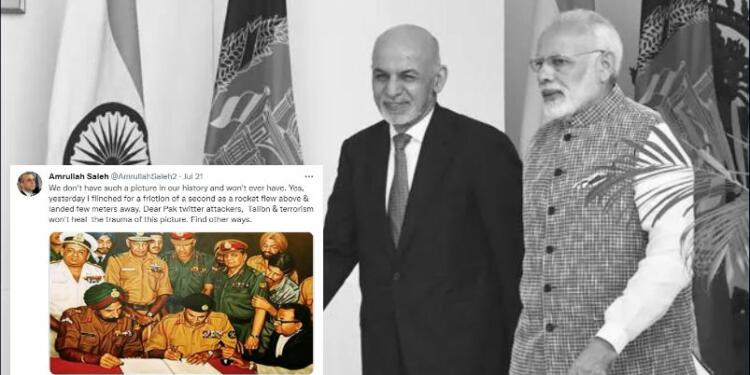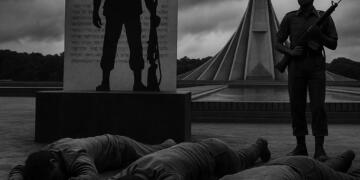Afghanistan’s Vice-President Amrullah Saleh hit it out of the ballpark on Wednesday by posting the legendary and famous picture of the Pakistan Army’s surrender to the Indian Army in the 1971 Bangladesh Liberation War. Saleh was taking on the troll army of Pakistan and simultaneously sending a message to New Delhi, egging it to assume a much more active role in the war-torn country as Afghan Taliban and Pakistan join hands to create chaos.
Posting the picture, Saleh wrote, “We don’t have such a picture in our history and won’t ever have. Yes, yesterday I flinched for a fraction of a second as a rocket flew above & landed few meters away. Dear Pak twitter attackers, Taliban & terrorism won’t heal the trauma of this picture. Find other ways.”
We don't have such a picture in our history and won't ever have. Yes, yesterday I flinched for a friction of a second as a rocket flew above & landed few meters away. Dear Pak twitter attackers, Talibn & terrorism won't heal the trauma of this picture. Find other ways. pic.twitter.com/lwm6UyVpoh
— Amrullah Saleh (@AmrullahSaleh2) July 21, 2021
In the picture, Pakistani Lt General AAK Niazi can be seen signing the ‘Instrument of Surrender’ in the presence of Lt General Jagjit Singh Aurora after the Indian Army thrashed the Pakistan Army. The document enabled the surrender of 93,000 soldiers of the Pakistan Armed Forces Eastern Command thereby ending the Bangladesh Liberation War and the birth of Bangladesh.
The timing of the tweet is important as Afghan army chief General Wali Mohammad Ahmadzai is visiting India next week with a three-day-long itinerary. Besides holding talks with his Indian counterpart, Gen MM Naravane, Ahmadzai is also expected to meet National Security Adviser Ajit Doval and other top security officials.
While, officially it is being stated that Wali would not be asking for any military support from his Indian counterparts but with the Afghan Taliban increasing its presence in the region, discussions are certainly expected to hover around the topic.
A person familiar with the developments said, “The Afghan Army Chief is scheduled to arrive in India on July 27 for a three-day visit. He is scheduled to return in the first half of July 30. Strengthening defence cooperation will be the focus of the visit.”
Ever since Washington started pulling out its troops from Afghanistan, the Taliban has seized control of over 85 per cent of the territory. The terrorist outfit has turned the clock back to the bloody era of 1996-2001 as dictatorial fatwas in consonance with the Sharia law are being imposed on the commoners.
Reported by TFI, one of the latest fatwa to be issued required members of Islamic clergy to compile a list of girls above 15 and widows under 45 so that they can be married to Taliban terrorists. Essentially, the Taliban wants sex slaves.
The letter, issued in the name of the Taliban’s cultural commission, said, “All imams and mullahs in captured areas should provide the Taliban with a list of girls above 15 and widows under 45 to be married to Taliban fighters.”
Read More: Teenage sex slaves and brutal Sharia law: The Taliban of 1996-2001 is back with a vengeance
Moreover, the Taliban, in close contact with Pakistan Army, ISI and Tehreek-e-Taliban Pakistan (TTP) has started to come after Indian interests in the region. Earlier this month, a spy had been caught by the Afghan forces who was attempting to destroy the Salma dam — India’s most expensive infrastructural project in Afghanistan, completed in 2016 at an estimated cost of $290 million.
The barbaric death of Indian photojournalist Danish Siddiqui, whose body was severely disfigured and mutilated after the Taliban came to know about his Indian identity further speaks volumes about the hatred and venom the Taliban has for India. Thus, New Delhi needs to drop its idealistic and neutral stance in the region, take note of Afghan leaders subtly asking for help and assume a greater role in the region.
If India wants to indeed proclaim itself as a leader in the region, it will have to fight the dirty wars. Afghanistan is India’s ally and stability in the region bodes well for both nations. Saleh’s call for help should be accepted and Ahmadzai should be given words of assurance when he visits New Delhi next week.





























What do the people of Afghanistan want is more important than what Bharat wants. Are the people of Afghanistan ready to stand up to claim and fight for what they want? If they are, then Bharat should certainly help. Else, the time has not yet arrived. We fought our own struggle to throw out Britishers. We are fighting our own struggle to defeat Islamic terrorism. Others may only help, but they would and should never fight for you. When Bengali Muslim population of East Pakistan stood up to fight for their freedom, Bharat helped in all possible ways. The next in line would be Baluchistan, before Afghanistan.